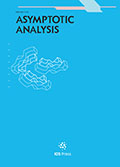Authors: Bruneau, Vincent | Raikov, Georgi
Article Type:
Research Article
Abstract:
We consider harmonic Toeplitz operators T V = P V : H ( Ω ) → H ( Ω ) where P : L 2 ( Ω ) → H ( Ω ) is the orthogonal projection onto H ( Ω ) = { u ∈ L 2 ( Ω ) ∣ Δ u = 0 in Ω } , Ω ⊂ R d , d ⩾ 2 , is a bounded domain with boundary
…∂ Ω ∈ C ∞ , and V : Ω → C is an appropriate multiplier. First, we complement the known criteria which guarantee that T V is in the p th Schatten–von Neumann class S p , by simple sufficient conditions which imply T V ∈ S p , w , the weak counterpart of S p . Next, we consider symbols V ⩾ 0 which have a regular power-like decay of rate γ > 0 at ∂ Ω , and we show that T V is unitarily equivalent to a classical pseudo-differential operator of order − γ , self-adjoint in L 2 ( ∂ Ω ) . Utilizing this unitary equivalence, we obtain the main asymptotic term of the eigenvalue counting function for T V , and establish a sharp remainder estimate. Further, we assume that Ω is the unit ball in R d , and V = V ‾ is compactly supported in Ω, and investigate the eigenvalue asymptotics of the Toeplitz operator T V . Finally, we introduce the Krein Laplacian K , self-adjoint in L 2 ( Ω ) , perturb it by a multiplier V ∈ C ( Ω ‾ ; R ) , and show that σ ess ( K + V ) = V ( ∂ Ω ) . Assuming that V ⩾ 0 and V | ∂ Ω = 0 , we study the asymptotic distribution of the discrete spectrum of K ± V near the origin, and find that the effective Hamiltonian which governs this distribution is the Toeplitz operator T V .
Show more
Keywords: Harmonic Toeplitz operators, Krein Laplacian, eigenvalue asymptotics, effective Hamiltonian
DOI: 10.3233/ASY-181467
Citation: Asymptotic Analysis,
vol. 109, no. 1-2, pp. 53-74, 2018
Price: EUR 27.50




